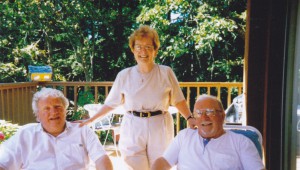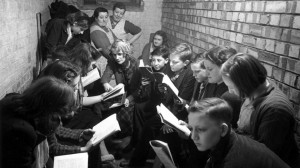Falling Down the Thames Blog 36, 19th November 2014
Paddling Past Family History
On Wednesday 6 May of next year, Krista and I will paddle our kayak out of the harbour at Whitstable on the north coast of Kent. The last two days of our journey will take us past Herne Bay and then on to Margate, Broadstairs, and Ramsgate. After taking a shortcut across Pegwell Bay, we will travel up the River Stour and past Sandwich, to end our journey at Richmond, the first site of Roman occupation in Britain.
Within the communities on the north and east coasts of Kent are much smaller settlements with names like Beltinge, Hillborough and St. Peter’s. These are part of my heritage, because I have heard many stories about them from my mum and her brothers who grew up there in wartime Britain.
Last week I wrote that Krista and I would be speaking at five primary schools as part of our Falling Down the Thames paddling adventure. One of these schools is in Canada, and the other four are in England; each is along our paddling route. I explained that the final presentation, at Reculver C. of E. Primary in Herne Bay, will be particularly relevant to me, as it was the school of my mum and my uncles, Desmond and Gerald, seventy-five years ago.
Mrs. Pettman was the headteacher at Reculver at the time, and my mum remembers the names of two other teachers, Miss Mann and Miss Jones. A lady named Peggy Wells cooked lunches in a small corridor for all the students. “We were assigned very small garden plots just outside the school fencing at the front, and had one class where we went out and tended them,” my mum said. “It was a happy time… There were benches where we used to eat lunch.”
My mum’s family lived on Rumfield Road in St. Peter’s when the war broke out. “The cliffs in Beltinge were where the concrete turrets were built for firearms in the event of an attack by Germany.” My mum has told me that classes would come to an end when the air-raid sirens rang. All of the students would put on gas masks, and go into underground shelters. She told me that it often seemed like a game. “The air raid shelter was in the back green space,” she said, “and we were in that shelter during the air raid in which my Dad was so badly injured in Margate.” As I remember the story, my grandfather required a year in a body cast after the explosion of a bomb caused a wall to fall on him.
According to my mum, a huge farm was operated in Acol during WWII by a man named Charles Willett. Across the street was a post office outlet operated by my grandmother. “Land Girls,” members of the Women’s Land Army, worked the agricultural fields, filling in for men who had entered military service. Mr. Willet had many pigeons, and my mum now wonders if some of these were trained to carry messages to and from the battle lines.
Over a period of two days, Krista and I will paddle within a few hundred metres of all of this family history.
- Glen
Photo credits: Children in an air raid shelter during World War II: Gornal and Sledgley – History, www.gornalandsedgley.org.uk


